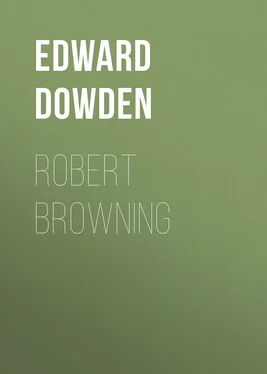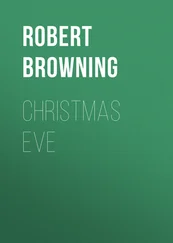Edward Dowden - Robert Browning
Здесь есть возможность читать онлайн «Edward Dowden - Robert Browning» — ознакомительный отрывок электронной книги совершенно бесплатно, а после прочтения отрывка купить полную версию. В некоторых случаях можно слушать аудио, скачать через торрент в формате fb2 и присутствует краткое содержание. Жанр: Биографии и Мемуары, Поэзия, foreign_antique, foreign_prose, foreign_poetry, на английском языке. Описание произведения, (предисловие) а так же отзывы посетителей доступны на портале библиотеки ЛибКат.
- Название:Robert Browning
- Автор:
- Жанр:
- Год:неизвестен
- ISBN:нет данных
- Рейтинг книги:5 / 5. Голосов: 1
-
Избранное:Добавить в избранное
- Отзывы:
-
Ваша оценка:
- 100
- 1
- 2
- 3
- 4
- 5
Robert Browning: краткое содержание, описание и аннотация
Предлагаем к чтению аннотацию, описание, краткое содержание или предисловие (зависит от того, что написал сам автор книги «Robert Browning»). Если вы не нашли необходимую информацию о книге — напишите в комментариях, мы постараемся отыскать её.
Robert Browning — читать онлайн ознакомительный отрывок
Ниже представлен текст книги, разбитый по страницам. Система сохранения места последней прочитанной страницы, позволяет с удобством читать онлайн бесплатно книгу «Robert Browning», без необходимости каждый раз заново искать на чём Вы остановились. Поставьте закладку, и сможете в любой момент перейти на страницу, на которой закончили чтение.
Интервал:
Закладка:
In love-poetry of the Middle Age the allegorical personage named "Danger" plays a considerable part, and it is to be feared that Danger too often signified a husband. In Wimpole Street that alarming personage always meant a father. Edward Moulton Barrett was a man of integrity in business, of fortitude in adversity, of a certain stern piety, and from the superior position of a domestic autocrat he could even indulge himself in occasional fiats of affection. We need not question that there were springs of water in the rock, and in earlier days they had flowed freely. But now if at night he visited his ailing daughter's room for a few minutes and prayed with her and for her, it meant that on such an occasion she was not too criminal to merit the pious intercession. If he called her "puss," it meant that she had not recently been an undutiful child of thirty-nine or forty years old. A circus-trainer probably rewards his educated dogs and horses with like amiable familiarities, and he is probably regarded by his troupe with affection mingled with awe. Mr Barrett had been appointed circus-trainer by the divine authority of parentage. No one visited 50 Wimpole Street, where there were grown-up sons as well as daughters, without special permission from the lord of the castle; he authorised the visits of Mr Browning, the poet, being fondly assured that Mr Browning's intentions were not those of a burglar, or—worse—an amorous knight-errant. If any daughter of his conceived the possibility of transferring her prime love and loyalty from himself to another, she was even as Aholah and Aholibah who doted upon the Assyrians, captains, and rulers clothed most gorgeously, all of them desirable young men. "If a prince of Eldorado" said Elizabeth Barrett to her sister Arabel, "should come with a pedigree of lineal descent from some signory in the moon in one hand, and a ticket of good behaviour from the nearest Independent chapel in the other—" "Why, even then," interrupted Arabel, "it would not do " One admirable trait, however, Mr Moulton Barrett did possess—he was nearly always away from home till six o'clock.
The design that Miss Barrett should winter abroad was still under consideration, but the place now fixed upon was Pisa. Suddenly, in mid-September, she finds herself obliged to announce that "it is all over with Pisa." Her father had vetoed the undutiful project, and had ceased to pay her his evening visits; only in his separate and private orisons were all her sins remembered. To admit the fact that he did not love her enough to give her a chance of recovery was bitter, yet it could not be denied. Her life was now a thing of value to herself, for it was precious to another. She beat against the bars of her cage; planned a rebellious flight; made inquiries respecting ships and berths; but she could not travel alone; and she would not subject either of her sisters to the heavy displeasure of the ruler of the house. Robert Browning held strong opinions on the duty of resisting evil, and if evil assume the guise of parental authority it is none the less —he believed—to be resisted. To submit to the will of another is often easy; to act on one's own best judgment is hard; our faculties were given us to put to use; to be passively obedient is really to evade probation—so with almost excessive emphasis Browning set forth a cardinal article of his creed; but Elizabeth Barrett was not, like him, "ever a fighter," and, after all, London in 1845 was not bleak and grey as it had been a year previously—"for reasons," to adopt a reiterated word of the correspondence, "for reasons."
On two later occasions Browning sang the same battle-hymn against the enemies of God and with a little too much vehemence—not to say truculence—as is the way with earnest believers. His gentler correspondent could not tolerate the thought of duelling, and she disapproved of punishment by death. Browning argues that for one who values the good opinion of society—not for himself—that good opinion is a possession which may, like other possessions, be defended at the risk of a man's life, and as for capital punishment, is not evil to be suppressed at any price? Is not a miscreant to be expelled out of God's world? The difference of opinion was the first that had arisen between the friends, and Browning's words carried with them a certain sense of pain in the thought that they could in any thing stand apart. Happily the theoretical fire-eater had faith superior to his own arguments;—faith in a woman's insight as finer than his own;—and he is let off with a gratified rebuke for preternatural submissiveness and for arraying her in pontifical garments of authority which hang loose upon so small a figure. The other application of his doctrine of resisting evil was even more trying to her feelings and the preacher was instant certainly out of season. Not the least important personage in the Wimpole Street house was Miss Barrett's devoted companion Flush. Loyal and loving to his mistress Flushie always was; yet to his lot some canine errors fell; he eyed a visitor's umbrella with suspicion; he resented perhaps the presence of a rival; he did not behave nicely to a poet who had not written verses in his honour; for which he was duly rebuked by his mistress—the punishment was not capital—and was propitiated with bags of cakes by the intruder. When the day for their flight drew near Miss Barrett proposed somewhat timidly that her maid Wilson should accompany her to Italy, but she was gratefully confident that Flush could not be left behind. Just at this anxious moment a dreadful thing befell; a gang of dog-stealers, presided over by the arch-fiend Taylor, bore Flushie away into the horror of some obscure and vulgar London alley. He was a difficult dog to capture and his ransom must be in proportion to his resistance. There was a terrible tradition of a lady who had haggled about the sum demanded and had received her dog's head in a parcel. Miss Barrett was eager to part with her six guineas and rescue her faithful companion from misery. Was this an occasion for preaching from ethical heights the sin of making a composition with evil-doers? Yet Browning, still "a fighter" and armed with desperate logic, must needs declaim vehemently against the iniquity of such a bargain. It is something to rejoice at that he was dexterously worsted in argument, being compelled to admit that if Italian banditti were to carry off his "Ba," he would pay down every farthing he might have in the world to recover her, and this before he entered on that chase of fifty years which was not to terminate until he had shot down with his own hand the receiver of the infamous bribe.
The journey of Miss Barrett to Pisa having been for the present abandoned, friendship, now acknowledged to be more than friendship, resumed its accustomed ways. Visits, it was agreed, were not to be too frequent—three in each fortnight might prudently be ventured; but Wednesday might have to be exchanged for Thursday or Saturday for Monday, if on the first elected day Miss Mitford—dear and generous friend—threatened to come with her talk, talk, talk, or Mrs Jameson with her drawings and art-criticism, or some unknown lion-huntress who had thrown her toils, or kindly Mr Kenyon, who knew of Browning's visits, and who when he called would peer through his all-scrutinising spectacles with an air of excessive penetration or too extreme unconsciousness. And there were times—later on—when an avalanche of aunts and uncles would precipitate itself on Wimpole Street—perspicacious aunts and amiable uncles who were wished as far off as Seringapatam, and who wrung from an impatient niece—to whom indeed they were dear—the cry "The barbarians are upon us." Miss Barrett's sisters, the gentle Henrietta, who preferred a waltz to the best sermon of an Independent minister, and the more serious Arabel, who preferred the sermon of an Independent minister to the best waltz, were informed of the actual state of affairs. They were trustworthy and sympathetic; Henrietta had special reasons of her own for sympathy; Captain Surtees Cook, who afterwards became her husband, might be discussing affairs with her in the drawing-room at the same time that Mr Browning the poet—"the man of the pomegranates" as he was named by Mr Barrett—held converse on literature with Elizabeth in the upper chamber. The household was honeycombed with treasons.
Читать дальшеИнтервал:
Закладка:
Похожие книги на «Robert Browning»
Представляем Вашему вниманию похожие книги на «Robert Browning» списком для выбора. Мы отобрали схожую по названию и смыслу литературу в надежде предоставить читателям больше вариантов отыскать новые, интересные, ещё непрочитанные произведения.
Обсуждение, отзывы о книге «Robert Browning» и просто собственные мнения читателей. Оставьте ваши комментарии, напишите, что Вы думаете о произведении, его смысле или главных героях. Укажите что конкретно понравилось, а что нет, и почему Вы так считаете.












